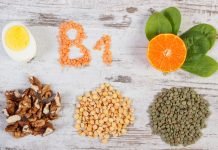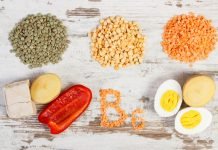What is vitamin B3?
According to the University of Maryland Medical Center, Vitamin B3, also known as niacin (nicotinic acid), is one of 8 B vitamins. It has two other forms including niacinamide and inositol hexanicotinate, which affect the body differently. (1)
The best way to get the vitamin B3 you need is by eating a healthy balanced diet. You can find B3 in turkey breast, avocado, chicken breast, mushrooms, tuna, liver, peanuts and more.
Proven health benefits
- Supports energy metabolism
- Reduces tiredness and fatigue
- Helps the nervous system to function
- Promotes healthy skin
Based on reports, It may help with
- Digestion
- Stress and related symptoms
- Acne, eczema and psoriasis
Vitamin B3 helps
1) Support energy metabolism
Vitamin B3 helps us to absorb chromium and utilise fats, carbohydrates and proteins. It follows that vitamin B3 can help the body regulate blood sugar levels and may support proper growth and development.
It is a good idea to eat vitamin B3 and chromium-rich foods together. For example, you can eat turkey, which is rich in vitamin B3 with broccoli which contains chromium.
2) Reduce tiredness and fatigue
Vitamin B3 deficiency can cause tiredness and fatigue. Supplementing on vitamin B3 may help prevent this, which may benefit individuals who take part in sports who want to maximise their performance.
The vitamin is involved in many pathways that help to release energy from fats and sugars. It also helps us to maintain our blood sugar levels and burn fats for energy. Ultimately, vitamin B3 can help to reduce tiredness and fatigue.
3) Support nervous system functioning
Vitamin B3, like many other B vitamins, can help our nervous system function and relieve stress, anxiety and low mood.
4) Promote skin health
Vitamin B3 deficiency can aggravate skin conditions such as acne, eczema and psoriasis.
Vitamin B3 works well with
- Zinc and other B Vitamins, to help ensure the proper digestion of carbohydrates, protein and fats
- St John’s Wort for low mood and anxiety
- Lemon Balm to alleviate bloating and flatulence, symptoms of mild anxiety and to aid sleep
- Vitamin C, taken alongside B Vitamins, to help support the absorption and utilisation of nutrients
- Lecithin, fish oils and garlic to manage cholesterol levels
- Ginseng, guarana, iron and CoQ10 to relieve fatigue and tiredness
Some things to consider
Niacin can cause flushing in some people. The flushing is likely harmless and can last a few minutes. You can reduce the likelihood of flushing by taking the vitamin supplement on a full stomach or buying a no flush formula like niacinamide.
How much do you need?
If you are between 19 and 64, on average you need:
- 16.5mg a day for men
- 13.2mg a day for women
You should be able to get all the vitamin B3 you need from your daily diet. According to the National Health Service (NHS), vitamin B3 can’t be stored in your body so you will need it in your diet every day. (2)
Resources:
- https://www.mountsinai.org/health-library/supplement/vitamin-b3-niacin
- https://www.nhs.uk/conditions/vitamins-and-minerals/vitamin-b/






